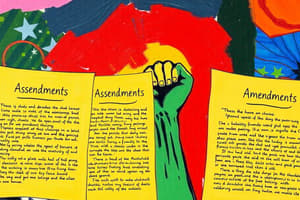Podcast
Questions and Answers
Match the following descriptions with the correct amendment: 1. Abolished slavery in the US 2. Guarantees equal access to the law and citizenship rights
Match the following descriptions with the correct amendment: 1. Abolished slavery in the US 2. Guarantees equal access to the law and citizenship rights
13th Amendment = Abolished slavery in the US 14th Amendment = Guarantees equal access to the law and citizenship rights
Match the following descriptions with the correct concept: 1. Passed in 1865 2. Ratified in 1868
Match the following descriptions with the correct concept: 1. Passed in 1865 2. Ratified in 1868
13th Amendment = Passed in 1865 14th Amendment = Ratified in 1868
Match the following concepts with their primary focus: 1. Abolishing slavery 2. Ensuring equal protection of the laws
Match the following concepts with their primary focus: 1. Abolishing slavery 2. Ensuring equal protection of the laws
13th Amendment = Abolishing slavery 14th Amendment = Ensuring equal protection of the laws
Match the following terms with their significance: 1. End of slavery 2. Expanding civil rights
Match the following terms with their significance: 1. End of slavery 2. Expanding civil rights
Match the following concepts with their impact: 1. Paved the way for equal rights for all 2. Protected citizens against discriminatory practices
Match the following concepts with their impact: 1. Paved the way for equal rights for all 2. Protected citizens against discriminatory practices
Match the following terms with their relevance: 1. Abolished slavery legally 2. Guaranteed citizenship rights and access to law
Match the following terms with their relevance: 1. Abolished slavery legally 2. Guaranteed citizenship rights and access to law
Match the following descriptions with the correct concept:
Match the following descriptions with the correct concept:
Match the following actions with the correct concept:
Match the following actions with the correct concept:
Match the following legal challenges with the correct concept:
Match the following legal challenges with the correct concept:
Match the following historical periods with the correct concept:
Match the following historical periods with the correct concept:
Study Notes
Matching Terms to Descriptions: 13th Amendment, 14th Amendment, Jim Crow, and Civil Disobedience
Overview
In this article, we will explore the relationship between various terms and their respective descriptions, focusing on the 13th Amendment, 14th Amendment, Jim Crow, and Civil Disobedience. These concepts are crucial in understanding the history of civil rights in the United States.
13th Amendment
The 13th Amendment, passed in 1865, legally abolished slavery in the United States. It states, "Neither slavery nor involuntary servitude, except as punishment for crime whereof the party shall have been duly convicted, shall exist within the United States, or any place subject to their jurisdiction." This amendment was a significant milestone in American history as it marked the end of slavery and paved the way for equal rights for all.
14th Amendment
The 14th Amendment, ratified in 1868, guarantees equal access to the law and citizenship rights for all American citizens, regardless of race. It reads, "No state shall make or enforce any law which shall abridge the privileges or immunities of citizens of the United States; nor shall any state deprive any person of life, liberty, or property, without due process of law; nor deny to any person within its jurisdiction the equal protection of the laws." This amendment played a vital role in expanding civil rights and protecting citizens against discriminatory practices.
Jim Crow
The era known as Jim Crow began after the Civil War and lasted until the mid-1960s. It was characterized by state and local laws designed to segregate African Americans from white people in the southern United States. These "Jim Crow" laws enforced racial segregation through various forms of discrimination, such as restricting access to education, employment, housing, and voting rights. The term originated from a minstrel show character named Jim Crow and was later used to describe the laws that enforced segregation on Blacks in the South after the Civil War.
Civil Disobedience
Civil Disobedience, a form of protest against laws considered unjust, was a tactic used during the Jim Crow era to challenge discriminatory practices. One notable example of civil disobedience occurred when Homer Plessy, a mixed-race resident of New Orleans, challenged Louisiana's Separate Car Act, which required white and non-white individuals to ride in separate train cars. Plessy's case eventually reached the Supreme Court, where he argued that the act violated his rights under the 13th and 14th amendments. Despite his arguments, Plessy lost the case, but his actions served as a catalyst for further activism and legal challenges against racial discrimination.
In conclusion, understanding these terms and their descriptions is essential for comprehending the history of civil rights in the United States. The 13th and 14th Amendments were critical in abolishing slavery and guaranteeing citizenship and equal protection under the law, respectively. Jim Crow laws enforced racial segregation, while civil disobedience was employed as a means of challenging these unjust practices. These concepts continue to shape our understanding of civil rights today.
Studying That Suits You
Use AI to generate personalized quizzes and flashcards to suit your learning preferences.
Description
Test your knowledge on the history of civil rights in the United States with this quiz covering the 13th Amendment, 14th Amendment, Jim Crow era, and Civil Disobedience. Explore the significance of these concepts in shaping the fight for equality and justice.




